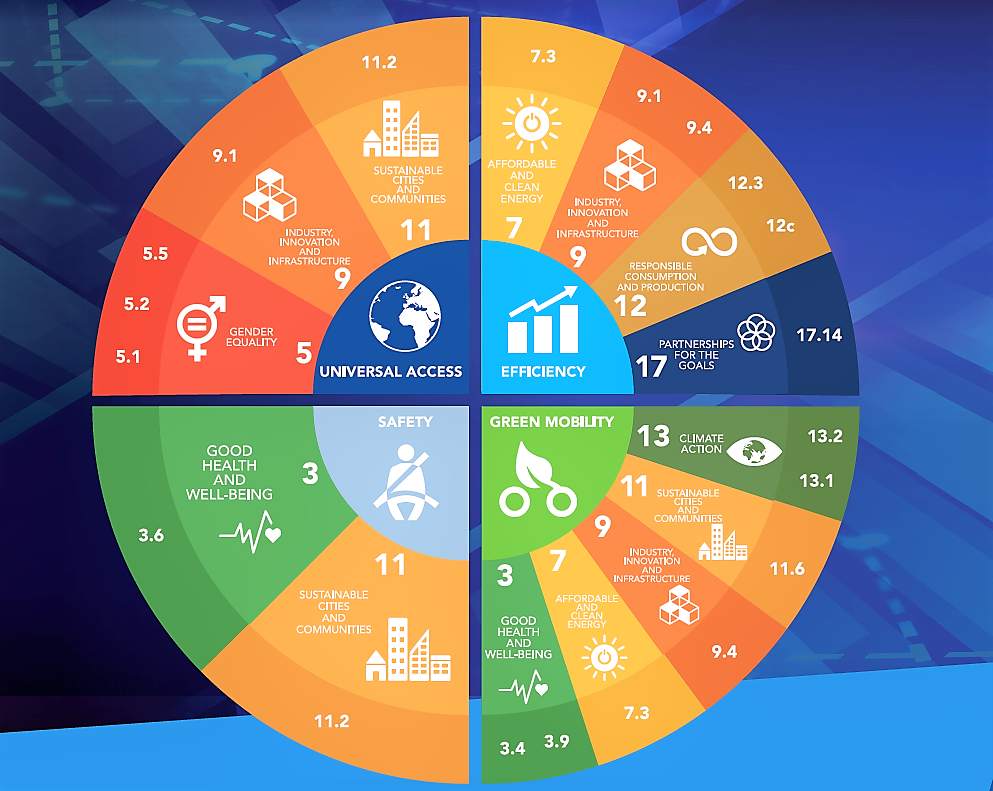Who they are
It all began in 2016, when the World Bank proposed at the 22nd UN Climate Change Conference in Marrakesh to bring together interested stakeholders under one roof to support the implementation of the Sustainable Development Goals (SDGs) and achieve sustainable mobility. This was done two months later, when Sustainable Mobility for All (SuM4All) was formally launched in New York in January 2017. The initiative brings together a diverse and influential group of transport stakeholders, with a commitment to speak with one coherent voice and act collectively to implement the SDGs and transform the transport sector.
The 17 SDGs are political objectives of the United Nations, intended to ensure sustainable development worldwide on an economic, social, and ecological level. They came into force on 1 January 2016 with a term of 15 years and apply to all countries of the world. The 17 overarching goals are explained and concretized by a further 169 goals, many of which are directly or indirectly linked to sustainable mobility.
The Global Roadmap of Action Toward Sustainable Mobility
The 55 organizations from the private and public sectors united under the umbrella of SuM4All have formulated four essential components without which sustainable mobility cannot function. These four global political goals are:
- Universal Access: To connect all people, including women and communities to economic and social opportunities.
- Efficiency: Optimize the predictability, reliability, and cost-effectiveness of mobility.
- Safety: Drastically reduce fatalities, injuries, and crashes.
- Green Mobility: Minimize the environmental footprint of mobility (GHG emissions, noise, and air pollution).
Since these universal components are not universally applicable to every country, region, or city on earth, the SuM4All Initiative aims to help every country individually on the way to achieve sustainable mobility. For this purpose, a fundamental report was written at the end of 2019 – the Global Roadmap of Action Toward Sustainable Mobility (GRA).
The report is impressive, it considers both problems and goals of sustainable mobility on a global and local level. For example, it states that one billion more people worldwide would have access to education, health care, and employment if rural areas were better connected. Better road safety could prevent 800,000 road deaths worldwide each year. Traffic flows must urgently be made less dependent on fossil fuels. The responsibility lies above all with the industrialized countries, as these are the countries with the highest emissions of transport-related greenhouse gases per head.
Assistance for the implementation of the SDG’s
Undoubtedly, the SDGs are behind the report, but unfortunately, according to the authors, there is often a lack of implementation. In some countries, for example, the construction of roads has been promoted to improve access to markets and work, but safety, noise, and air pollution have not been taken into account. In many cases, individual technologies, such as electric vehicles, are also being overly promoted, thereby hindering the expansion of the diversity of transport modes. All in all, the SuM4All experts urgently call for a fundamental transformation of the transport policy system.
Before tackling the particular difficulties of an individual country and initiating the necessary transformation in each case, the situation must be thoroughly analyzed. SuM4All offers an extremely interesting tool for this purpose, which allows us to look at each country individually and analyze it concerning the political goals Universal Access, Efficiency, Safety, and Green Mobility. In the next step, this “Online Tool Toward Sustainable Mobility” offers the possibility to browse through a catalog of 182 policy measures, examine options for achieving sustainable mobility, and consider their effects.
SuM4All presents various instruments for this in four toolboxes:
- The communication toolbox helps to develop public campaigns to influence behavioral change, to make sustainable transport alternatives recognizable, and to manage knowledge.
- The Economic and Financial Toolbox recommends measures for financing and pricing, taxes and subsidies, innovation policy, and cost-efficiency of the transport sector.
- The Technology Toolbox deals with the planning, provision, and maintenance of infrastructure. Technical standards must take safety concerns into account.
- The regulatory and institutional toolbox includes, for example, better coordination between modes of transport and the corresponding expansion of transport options. Also important are regulations for cross-border traffic, transport services, vehicle use, and data handling.
In the last step, it is possible to view the top 30 measures proposed for your country based on your mobility performance, and customize your action plan. Countries, which are interested in further tailoring the path toward achieving sustainable mobility by developing a country mobility diagnostics, are invited to contact SuM4All. Better ask the question: Who is not interested? In 2020, South Africa and Ethiopia are to pilot the implementation of country action plans. I can not wait to see the results…
SuM4All presents a very interesting Roadmap and an amazing Online Tool, which I can not stop to use and learn. It undoubtedly widens my horizon concerning worldwide sustainable mobility!
